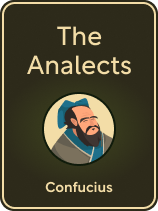

This article is an excerpt from the Shortform book guide to "The Analects" by Confucius. Shortform has the world's best summaries and analyses of books you should be reading.
Like this article? Sign up for a free trial here.
When you observe others, what do you learn? What kind of people should you seek to learn from?
In The Analects, Confucius discusses the importance of learning from other people. This might be through an actual teacher-learner dynamic or simply through observation. He says it’s important to learn from the right people, and he explains how you can find them.
Keep reading for advice from Confucius on how to learn from others.
How to Learn From Others
Confucius urges you to learn whatever you can from other people, and he shares some practical tips on how to learn from others. One method is open-minded observation: When you’re with others, observe their good qualities (such as humility, honesty, or generosity) and try to emulate them. At the same time, look for bad qualities (such as pride, selfishness, or cruelty) and try to correct those faults in yourself.
(Shortform note: It’s common knowledge that children learn by imitating adults. What’s less commonly acknowledged is that imitative learning (also called mimetic learning) continues throughout a person’s life. There are three steps to mimetic learning: First, you observe a behavior that reflects a good quality. Then, you imitate it. Incorporating a good quality into your personality requires a third step called modeling: viewing the person you’re imitating as a role model and repeatedly imitating their behavior. In other words, it’s not enough to simply copy another person’s actions—you have to respect that person and have a strong desire to continue emulating their good qualities. Doing so can arguably help you overcome those good qualities’ opposites—for instance, by replacing pride with humility.)
However, don’t just learn from others through observation; welcome opportunities for them to actively teach you. Confucius recommends asking questions whenever possible and always welcoming the chance to be corrected. If someone proves you wrong about something, thank them for teaching you rather than getting upset that you made a mistake.
(Shortform note: Ego can get in the way of following this advice—be careful not to let your pride stop you from learning new things. In Ego Is the Enemy, Ryan Holiday describes two ways that ego can harm learning. First, you might believe you already have all the skills and knowledge you need—nobody else could possibly teach you anything worthwhile. Second, ego can make you unwilling or unable to learn from mistakes—you’re more concerned with your feelings of embarrassment or the damage to your image than you are with correcting and learning from errors.)
Confucius cautions you to make sure you’re learning from the right people. The people you spend time with will influence your thoughts and your behavior, so make sure you’re surrounding yourself with good influences.
First, he says, only befriend people who are kind and respectful; in other words, people whose behavior is worth emulating. Second, seek out people who share your artistic and cultural interests. When you have common interests with your friends, you can help each other to develop your understanding and appreciation of those things.
| Social Influences Are Powerful and Far-Reaching Author and entrepreneur Jim Rohn famously said, “You’re the average of the five people you spend the most time with.” In other words, the people around you exert a large influence on how you act, how you think, and what kind of person you ultimately become. That’s arguably why it’s so important to surround yourself with kind and respectful people, as well as people who will encourage your artistic and cultural interests. It may not just be your closest five friends who impact you, though. Some research has found that second-degree (friend of a friend) and third-degree (friend of a friend of a friend) social connections also influence your behavior. This means that choosing the right friends might not be enough to completely protect you from bad influences; their friends, and even friends of their friends, can still influence you. |
How to Find the Right People
Naturally, finding the right people to befriend means that you have to know how to evaluate people. As we discussed previously, you can evaluate people by closely observing their good and bad qualities. Now, however, Confucius specifically recommends judging people’s actions rather than their words. It’s easy for people to say the right things and pretend that they have strong moral character, but much more difficult for them to actually do the right things.
(Shortform note: Confucius urges you to judge people’s actions rather than their words, but some psychologists argue that speaking is also an action. Therefore, it shouldn’t be treated differently from other kinds of actions. Further, they note, everything a person does—including speaking—is goal-oriented. Therefore, the best way to learn about people is by figuring out what they want. What goals are they trying to achieve? Are those goals compatible with your beliefs and values?)
You can gain additional insight into people’s characters, and whether they share your artistic and cultural interests, by observing where they feel most at home. For example, someone who’s most comfortable in a crowded bar is a very different kind of person from someone who’s happiest in a quiet library. Make sure that you and your friends are happy to spend time in the same places; that’s a good sign that your interests and personalities are compatible.
(Shortform note: Many adults find it difficult to make new friends. Confucius’s advice to look for people who enjoy spending time in the same places that you do may be particularly helpful in solving that problem; just go places you enjoy and you’re likely to meet people who have similar interests and personalities to yours. If you still have trouble meeting people, you could try joining a group that meets regularly, such as a gaming club or a Bible study group.)

———End of Preview———
Like what you just read? Read the rest of the world's best book summary and analysis of Confucius's "The Analects" at Shortform.
Here's what you'll find in our full The Analects summary:
- A collection of Confucius's teachings compiled by his students
- Lessons about how to be a good learner, person, and leader
- Concrete methods for putting Confucius’s teachings into practice






